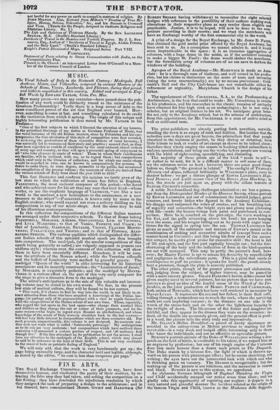MUSIC.
The Vocal Schools of Italy in the Sixteenth Century : Madrigals, Full Anthems, Motets, and Villanellas, composed by eminetit Masters of the Schools of Rome, Venice, Lombardy, and Florence, during that period, and hitherto unpublished in this country. Edited and arranged to English Words by EDWARD TAYLOR, Gres. Pro. Mts.
How many years—we may say centuries—have passed since the publication of any work could be distinctly traced to the existence of the Gresham Professorship ! Verily there is a long an•ear of debt to the most munificent patron of the art that England ever boasted. However, something is come at last, and something calculated to do credit to the institution from which it sprung. The origin of this unique and highly interesting publication is thus stated by Mr. TAYLOR in his Preface— "One of the first subjects to which I directed the attention of my hearers, in the periodical discharge of my duties as Gresham Professor of Music, was the vocal harmony of the old Italian masters, since by Palestrina and his contemporaries the true attributes of this style of composition were first revealed. In reviewing the productions of these venerable fathers of vocal harmony, I was naturally led to recommend their study and practice ; assured that, as they have been regarded as models of excellence by the most eminent choral writers of every age and country, so they will open a perennial spring of enjoyment to all who take pleasure in mimic of voices.' Those to whom their excellencies are familial., will be inclined, with me, so to regard them : but compositions which exist only in the libraries of collectors, and for which our music-shops would be searched in vain, can be known to comparatively few persons. A desire to make them, in some degree, accessible to the public, has occasioned the compilation of the present volume ; the contents of which are derived from the various schools of Italy from about the year 1540 to 1610."
This fact illustrates and confirms the opinion we lately gave of the low state to which the cultivation of music has fallen in England. PALESTRINA, the most eminent composer of this period—who dared and who achieved more for his art than any man that ever lived—whose works, to use the emphatic language of CLEMENTI, "are like a new world to the mariner, a new hemisphere to the astronomer, or a new treasure to the miner"—PALESTRINA is known only by name to the English student ; who could expend not even a solitary shilling on his compositions in any of our music-shops. And the same may be said of his illustrious contemporaries.
In this collection the compositions of the different Italian masters are arranged under their respective schools. To that of Rome belong
PALESTRINA, MORALES, AMERIO, GIOVANNELLL LUD. DI VICTORIA, and Luca Km:x=0 ; to that of Venice, FEnErrt and CROCE ; to that of Lombardy, GASTOLDI, RENALDI, VECCHI, CLAUDIO MONTEVERDE, PALLAVICINO, and TROPE° ; and to that of Florence, ALESSANDRO STIGGIO. The various qualities which distinguished the different Italian schools of this splendid musical epoch are thus brought into comparison. The madrigals, (all the secular compositions of this epoch being generally so called,) are vulgarly supposed to possess one uniform style ; whereas even the contents of this collection will show them to have been essentially different. Grandeur, it will be seen, was the attribute of the Roman school ; while the Venetian villanelle and the Lancia of Lombardy were marked by graceful gayety. The madrigal "Queen of the world" is alike interesting for its historical associations and its masterly construction ; the "Lamentation of Jacob," by MORALES, is exquisitely pathetic ; and the madrigal by MONTEVERDE is a curious effort on the part of this very early composer for the stage to give a dramatic form to the madrigal. The editor's anticipations as to the sale of this valuable and interesting volume may be stated in his own words. We fear, in the present low state of musical culture, they will be found to be too correct. " This work, if it chance to find its way into the world, is not likely to attract attention from those who have acquired a knowledge of the Italian language (or perhaps only of its pronunciation) with a view to regale themselves with the compositions of the Italian school of our own time. Those, especially, who regard the last opera as the best opera—who change their musical likes and dislikes as they change the cut or colour of their garments, and for the same reason—who begin to regard even Rossini as old-fashioned, and whose knowledge of the music of Italy scarcely stretches back to the last century— will very little interest in compositions which are three centuries old. For such persons, unquestionably, this volume is not designed. Its contents tei ther seek nor want what is called 'fashionable patronage.' My anticipations as to its sale are very moderate : but compositions which have outlived three centuries will command a certain portion of respect, and 'fit audience find though few.' If the loss attendant on its publication be not too severe, I shall turn my attention to the madrigals of the English school, which nitiy almost be said to be unknown in the land of their birth. This is not very creditable to the musical taste or patriotic feeling of England."
We will only add, that the work is very handsomely got up ; the page being unusually large, and the character bold and legible, although, as stated by the editor, " its cost is less than twopence per page."


























 Previous page
Previous page